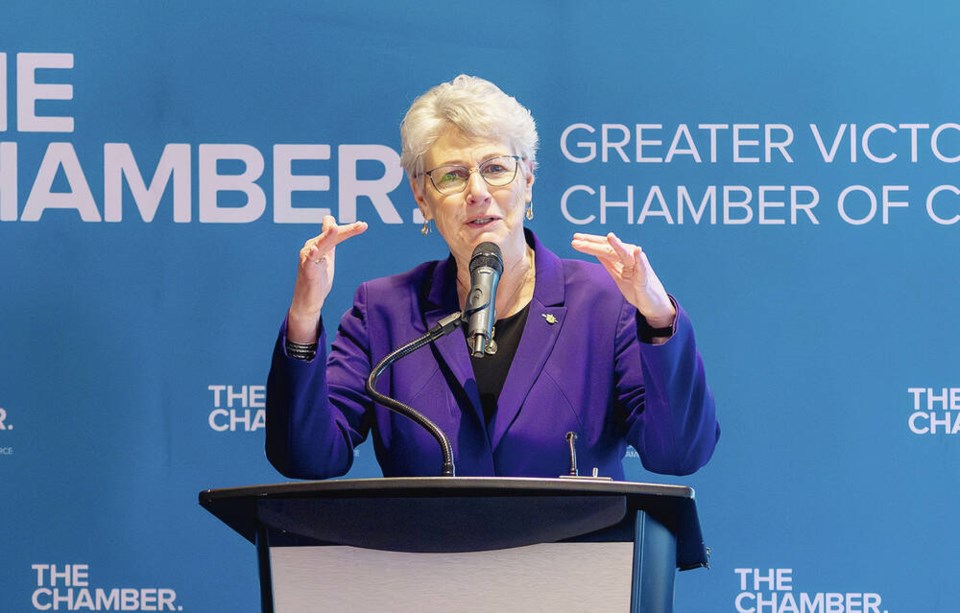Public safety was a top concern for Greater Victoria Chamber of Commerce members at a Friday luncheon where B.C. Finance Minister Katrine Conroy paid a customary post-budget visit and took questions.
Chamber chief executive Bruce Williams told Conroy public drug use and street disorder is a “major concern” and asked how the province is supporting non-profit organizations who work with the street population, and whether it will expand the court system to better deal with repeat offenders.
Conroy said the province has established 12 hubs — including two on Vancouver Island, in Victoria and Nanaimo — where police, prosecutors and probation officers work together to break the cycle of repeat violent offending.
“Public safety is a big priority and we are taking action through the Safer Communities action plan to keep violent repeat offenders out of the street,” Conroy said.
Williams said later in an interview that he’s happy the province is putting “a fair amount of money” into helping people beat addictions and manage mental illnesses, but “at some point” it needs to be determined whether people are capable of making sound decisions regarding their health.
Being able to access appropriate care — whether voluntary or not — can help keep people safe, he said, adding many people are living on the street because of the effects of brain injuries.
“They’re dealing with mental illness, they’re dealing with addictions — they’re not always capable of making a decision in their own best interests.”
In response, Conroy said experts are divided on whether involuntary treatment is effective, adding human rights groups and Indigenous communities have voiced their concerns about it. “You have to balance it all and make sure what you’re doing is not harming the person — that you’re actually helping them.”
Jeff Bray, executive director of Victoria Downtown Business Association, said this week that he isn’t seeing anything “creative or bold” from the province when it comes to tackling street disorder. “We see absolutely nothing in this budget from a policy perspective or a funding perspective to deal with the street-disorder issues that are impacting urban centres large and small right across the province … just a continuation of what’s currently operating, which we would argue is not working.”
In 2020, the provincial government proposed mandatory treatment for youth who repeatedly overdosed, but gave up that plan after facing heavy criticism.
Premier David Eby said during his leadership campaign in 2022 that involuntary care should be an option for people who run the risk of serious health consequences from multiple overdoses, but has not introduced any such policies.
Thursday’s speech from the throne emphasized B.C.’s support for a more connected system of voluntary mental-health and addictions care across the province.
A total of $215 million over three years has been budgeted for mental-health and addiction services across B.C., of which $117 million is earmarked for continuing health and substance-use treatment beds at about 3,000 health authority and community-care facilities.
Within that, $49 million has been set aside for harm-reduction initiatives at 49 overdose prevention sites and another $39 million for mobile integrated crisis-response teams.
There is money for funding an expansion of Red Fish Healing Centre for Mental Health and Addiction, located at the former Riverview Hospital in Coquitlam, but details won’t be known until a business plan is approved.
— with files from Carla Wilson and The Canadian Press



